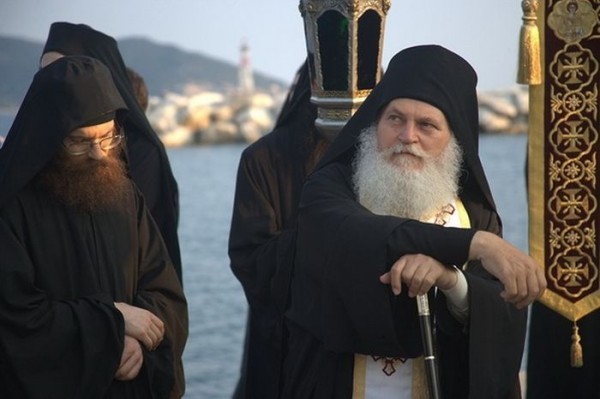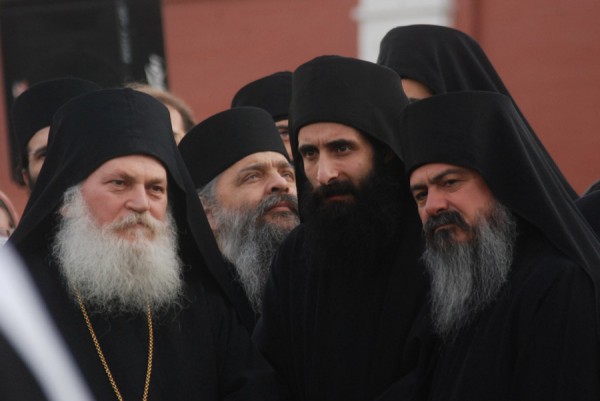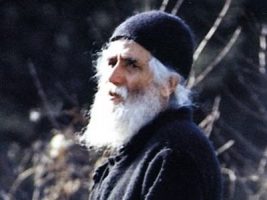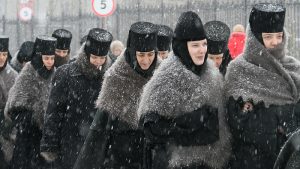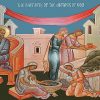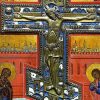This interview was conducted during the first “International Conference on Digital Media and Orthodox Pastoral Care.”
Question: Were you born into a believing family? What was your first conscious encounter with God?
Fr. Ephraim: I come from a rural family, from a poor village. My parents were farmers. My father was a hard worker, but not especially a church person. My mother was a person of God. And my first spiritual inspiration came from the Batiushka, the priest in our village. I was drawn to church life: I put a towel around my neck and served the “Liturgy” in childhood. I understood and grasped everything, then repeated it, and made dismissals.
Question: What influenced your decision to become a monk? Who was your spiritual father?
Fr. Ephraim: My spiritual father was the Elder Joseph of Vatopedi. And I became a monk because grace attracted me.
I couldn’t even imagine this way of life: the first time I came to Athos was when I was eighteen years old. I studied in a church school, and one of my classmates, who also wanted to become a monk, but who ultimately became a married priest, said that in one civilian newspaper there were articles about the Holy Mountain. I began to read these articles and wanted to come to Athos. Then a year later we came to the theological school in Athens to study, and in 1975 I came to Athos for the first time.
On the program was a meeting with the Elder Ephraim of Katounakia, who reposed in 1998. He had a strong charisma from God. We were then five students. He looks at me: “You,” he says, “will become a monk.” I went crazy with grief! “You will also put on the epitrachelion,” he says, “and become a priest.” And moreover he says: “You will also be of our spiritual kin: disciples of Joseph the Hesychast.”
I couldn’t sleep because of this! What a nightmare: how would I become a monk?! I went to Gregoriou Monastery and asked for a meeting with the abbot of the monastery, Fr. George, a spiritual person. “I,” I say, “am very sad: I was in Katounakia, and the Elder Ephraim gave me such an answer.” “The Elder Ephraim said such a thing to you? Then it’s settled,” he says, “of course. He never misses the mark.” I became even worse off, my sorrow increased. Another Elder confirmed the words of the first one!
I then went to Burazeri, which is a large cell where there lived the spiritual brother of the Elder Ephraim, the Elder Haralampos, who was also one of the neptics, one of the watchful fathers. Whomever I met of the spiritual fathers, I told them all of my pain: I had different thoughts and plans in life. How stupid I was then! When I read St. John of Kronstadt, he had such an influence on me, that I also wanted to live in a “white” marriage (he lived with his wife like brother and sister) like him.
I tell the Elder Haralampos: so forth and so on, this is my woe. “The Elder Ephraim,” he says, “told you this?” “Yes.” “Then that’s all there is to say,” he says. And from that time on I was called a novice. Everyone joked among themselves: “You’re a novice,” “You’re a novice.” And I wanted to die from grief. Five years after this I became a monk, that is, the prophecy was fulfilled.
Then I also met the Elder Joseph of Vatopedi who, like Ephraim of Katounakia, was also a disciple of Joseph the Hesychast. They all contributed greatly to the hesychastic revival on the Holy Mountain.
Question: In Russia we have a special attitude towards Athos. We see the Holy Mountain as a place that is maximally close to the ideal of monasticism. Every Russian monk and novice hopes to struggle on Athos, and the simple faithful dream of at least spending a day there. What is it about the Holy Mountain that attracts people?
Fr. Ephraim: The Holy Mountain of Athos is the only existing monastic state in the world, which preserves the whole Orthodox tradition. What is monasticism? Monasticism is the detailed observance of the Evangelic commandments, of the Gospel. That means that wherever monasticism is experienced practically, Orthodoxy is experienced practically.
When we talk about Tradition, we don’t have in mind folklore or some kind of folk customs. By Tradition we mean the art and technique of holiness, which is passed on practically from person to person. The Holy Mountain promotes the achievement of this goal. Our Russian brethren seek and yearn for this genuine, real Orthodox word, and therefore they love the Holy Mountain, and we also love them. Therefore many of them stay with us, and we pray for them.
Question: The Tradition of the Holy Mountain has existed for more than 1,000 years, and each monastery has its own. What are some of the characteristics of Vatopedi that are especially dear to you?
Fr. Ephraim: Every monastery has different versions of fulfilling the Typikon, but the Orthodox Tradition is one. Some say that there is a Russian Tradition, or a Greek or Romanian one, but they emphasize that they do not have the spiritual life in mind. In the spiritual life there is one Tradition: Orthodoxy. But as far as, for example, church chanting or secondary questions of ritual – there might be different particulars.
Our theology is the same that is experienced practically by all, and we can all be partakers of this theology: a theology that was given to us by the Incarnate God the Word. On Athos, I love the All-Night Vigils and the solemn Liturgies. That does not mean that the Divine Services in other places – in your country or in others – is of secondary importance. I asked one of your colleagues whether he goes to church or not. “No,” he says, “I only go to church on Athos.” “Why?” I ask. “Because only here,” he says, “is there a good Liturgy.” “You are mistaken: it is not only here.”
The dogmatic and spiritual aspects of the Liturgy are one whole, but on Athos there is a different spiritual atmosphere. On Athos the silent, hesychastic atmosphere is more helpful in absorbing the Divine services, because the Holy Mountain is an especially grace-filled place. In every monastery there dwell the prayers of the departed fathers, the prayers of living fathers. Every monk on Athos learns to pray constantly, without ceasing.
On the Holy Mountain there are many wonder-working icons of the Mother of God and very many holy relics. All of this spiritually adorns the place. And all of this so prepares the hearts of monks and pilgrims, that they become sensitive to the Divine services. I’m on my fourth day away from Athos, and I feel like a year has already gone by: that’s how seized I am by this atmosphere, by the spiritual quality that abides there, and by the place itself.
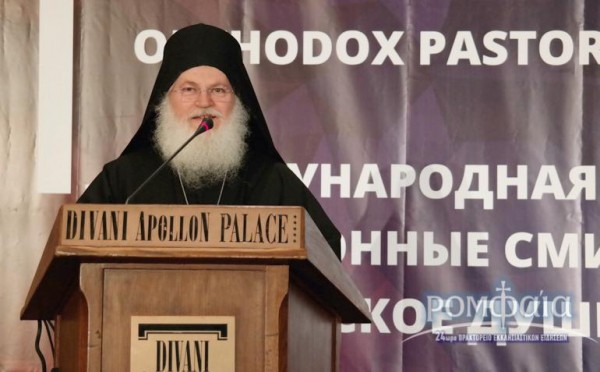
Archimandrite Ephraim speaks at the first “International Conference on Digital Media and Orthodox Pastoral Care.”
Question: The year 2016 will mark the thousandth anniversary of the Russian presence on Athos. There are Russian monks and novices in nearly every Athonite monastery. What is the face of the Russian Athonite today? How does one become an Athonite in our day?
Fr. Ephraim: The celebration of the millennium of the presence of Russian monasticism on Athos is indeed justified. Very many Russian monks have pleased God over these thousand years. The Russian Monastery of St. Panteleimon issued a book – one might say it’s a modern Russian Athonite Paterikon. I’m now reading this book and marvel at how the Russian ascetic strugglers compelled their human nature to the accomplishment of monastic duties and vows.
The crown of Russian Athonite monks is St. Silouan the Athonite. He is truly one of the greatest of saints, someone of the highest spiritual level. I remember how, before his canonization, our ever-memorable spiritual father, the Elder Joseph, read the book by the Elder Sophrony, the founder of the Monastery of St. John the Baptist in Essex, who was a disciple of the Elder Silouan and his biographer.
Fr. Joseph often told us how inspired he was by the book Staretz Silouan, and about how much grace he received through reading this book. And he cited St. Silouan as an example, because thanks to this book (in which not only the words of St. Silouan himself are important, but also those of the Elder Sophrony, who set them out correctly theologically – in my opinion, he’s also a saint) the greatness of Orthodox dogma, and the lofty value of the Orthodox life, is presented.
I know from my own experience that very many people have become Orthodox through this book, and many young people have become monks by reading and studying it.
Question: Modern man finds it difficult to imagine an every-day, every-minute life with God. It is easier on Athos?
Fr. Ephraim: On Athos it is much simpler. Yesterday evening here in my room I was reading something by a disciple of the Elder Sophrony, Fr. Zacharias, who transmits the teaching of his Elder to his disciples. And he wrote something very interesting, about which I’ve previously thought, but did not dare express.
The Elder Sophrony said: there are very many saints in the world, who have received much grace due to various difficulties and trials that they have experienced on their life’s path, and from the fact that they had patience according to the commandments of the Gospel. But, says the Elder Sophrony, regardless, only monks can attain pure prayer, and this they attain through the obedience that they show to their spiritual mentors. This obedience gives them a very profound freedom from care and concern. And when a monk has no concerns, then he is free to engage in prayer.
I’d like to say that in today’s world the presence of monasticism in such places as the Holy Mountain is especially important, because they have a great spiritual effect.
Question: A monk is someone who lives in union with God. But what is love of God?
Fr. Ephraim: A monk thirsts for God, he strives for God. And here is a kind of mystery, a kind of miracle: not only a monk, but any Christian who seeks to love God, receives in return Divine Uncreated Energy in his heart. And the more this Uncreated Energy increases in his heart, the more he loves God. We, Orthodox Christians, attach great significance to the first commandments: to love God with all one’s heart, all one’s strength, all one’s mind, and all one’s understanding.
It’s very important that man love God. There is no end to this love. In the Book of the Wisdom of Jesus, the Son of Sirach [i.e., Ecclesiasticus], it’s written: “They that eat Me shall yet be hungry, and they that drink Me shall yet be thirsty” (Sirach 24:21).
Translated from the Russian.












